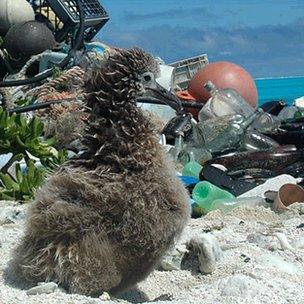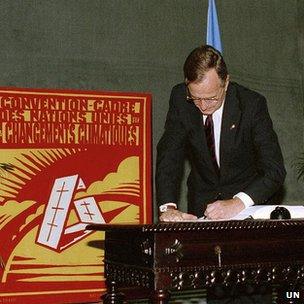Rio looks to the future
- Published
- comments

The impacts of marine pollution, felt across the world, may be tackled by a new initiative
What might the Rio+20 summit deliver?
We have a little more idea now, following publication of the "zero draft" outcome document, external for the June summit.
It's been compiled by the chairs of the preparatory process, following a huge amount of dialogue and input from governments and other interested parties.
But with much more dialogue due, a lot can change between now and then.
This Rio summit, like the last one 20 years ago, external, isn't part of the UN negotiations on climate change or biodiversity or desertification or anything else.
It's bigger than that. It's a chance for world leaders to take a long view of where the global society is heading, and whether they're happy with that.
If they're not - and there's a welter of evidence showing that we're doing a pretty poor job of looking after the liveable bits of Planet Earth, external, let alone many of its inhabitants - it's a chance to agree some new principles.
At its most basic, the zero draft is basically a set of ingredients for changing direction onto a new sustainable course.
If environmental decline is a major driver, others are the lack of resilience in the global economy shown up by the current extended financial crisis, and the continuing lack of development in the world's poorest countries.
So - what might the Rio+20 summit deliver?
The zero draft sets out principles of universal access to the essentials - food, water and energy.
A major goal is "to free humanity from hunger and want through the eradication of all forms of poverty and strive for societies which are just, equitable and inclusive, for economic stability and growth that benefits all".

Rio has just felt the impact of heavy weather and poverty, with many dead in recent floods
In order to provide "proper nutrition" for all, it calls for "sustainable intensification of food production" - expanding the food supply without expanding the amount of land, water and other resources needed.
Another goal is to provide "universal access to a basic minimum level of modern energy services" by 2030.
And to make that sustainable from an environmental perspective, the proportion of energy coming from renewable sources should double by the same date.
One of the routes to achieving these aims would be to phase out "market distorting and environmentally harmful subsidies that impede the transition to sustainable development, including those on fossil fuels, agriculture and fisheries..."
These various strands would come together in a new set of Sustainable Development Goals (SDGs).
Precisely what they would contain isn't specified. They'd be agreed by 2015, when most of the existing Millennium Development Goals (MDGs), external expire, and would carry target dates of 2030.
To help developing countries, the rich should supply "new, additional and scaled-up financing", as well as making good on their existing commitments.
In the context of the current economic difficulties, it's worth taking a couple of paragraphs out to look back 10 years to the meeting in Mexico that spawned the Monterrey Consensus on Financing for Development, external.
The bit that most people would remember would be the re-affirmation that developed nations should commit 0.7% of their GDP to overseas development assistance.

President George Bush went to a Rio Earth Summit in 1992, but Barack Obama's intentions are not clear
Less familiar, perhaps, are the bits committing governments to economic policies that produce full employment, price stability and the "orderly development" of capital markets.
Some way to go on those, you might observe.
By raising these issues, the Monterrey Consensus hints at the fact that there's more to a country's health than simple GDP.
And that's given explicit form in the Rio+20 draft, which would see governments agreeing "to further develop and strengthen indicators complementing GDP that integrate economic, social and environmental dimensions in a balanced manner".
Many of these ideas are already finding form in various countries, often in the basket marked "green growth" or the "green economy", external.
The zero draft recognises that although each government will make its own decisions, there are ways in which global co-operation can speed progress.
So some kind of international "toolbox" will be developed, containing ideas that have worked in different parts of the world.
The private sector would be expected to play a prominent role, under "a global policy framework requiring all listed and large private companies to consider sustainability issues and to integrate sustainability information within the reporting cycle".
If that might sound like a business straitjacket, it's worth noting that a number of big companies are actively lobbying for such a thing, external.
On the straight environmental side, there's to be extra help for developing countries in dealing with waste, notably electronic waste
Marine issues feature, with a call for "a global action plan to combat marine litter and pollution", including materials such as plastics whose impact was documented so vividly by my colleague David Shukman a few years back, external.
Ocean acidification would be monitored and tackled, and governments urged to meet existing commitments on reducing over-fishing.
The influence of the UN Environment Programme would be enhanced, external by upgrading it in a way that's yet to be finalised.
One of the most eye-catching ideas is "an Ombudsperson, or High Commissioner, for Future Generations".
The document doesn't call for such a person, but for "further consideration" of the idea. That'll disappoint some - but still, it's on the agenda.
The reason why it's there goes to the heart of what sustainable development is and why it matters.
The simple Brundtland Commission, external definition - "development that meets the needs of the present without compromising the ability of future generations to meet their own needs" - carries the pretty obvious implication that future generations are important.
But who's there to argue for them? Clearly they can't do it for themselves - so why not have part of the UN system empowered and enabled to do it on their behalf?
This is only a "zero draft" document, and you have to presume that the wording will change quite a bit over the months to the summit, as governments and civil society groups and businesses digest what it all implies.
But you also have to presume that at least some of it will survive.